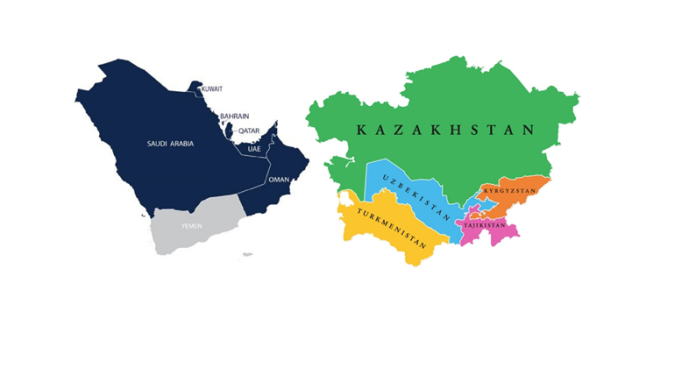The international expert community is paying special attention to the transformation of the role of regional diplomacy in the modern world. Diplomatic dialogue between various regions is becoming a key instrument not only for strengthening international ties but also for effectively addressing global problems in the context of growing interdependence among states.
In this context, the cooperation format between the Gulf Cooperation Council (GCC) and Central Asia (CA) represents a unique model of interregional interaction. The uniqueness of this format lies in the fact that it unites two geostrategically important regions, each with its own specific development characteristics, yet sharing deep historical, cultural, and religious ties.
Historical Perspective of Diplomatic Relations
The interaction between Central Asia and the Arabian Peninsula, spanning over two millennia, has undergone several significant transformations.
The Great Silk Road, which emerged in the 2nd century BCE, created the first system of sustained economic contacts between the regions.
The spread of Islam in the 8th century added a spiritual and intellectual dimension to this interaction. Cities such as Samarkand and Bukhara became scientific centers of the Islamic world. Prominent Central Asian scholars – Al-Bukhari, Al-Khwarizmi, and Ibn Sina – produced works that became foundational for the entire Islamic civilization.
From the 16th century onward, traditional ties weakened due to geopolitical changes and the discovery of maritime trade routes. In the 20th century, Soviet isolation further distanced the regions from each other.
The independence of Central Asian states in 1991 opened a new chapter in their relations.
Key Stages in the Formation of Diplomatic Dialogue
The formation of systematic diplomatic dialogue between the GCC and Central Asia has gone through several important stages, each contributing significantly to the development of cooperation between the two regions.
First Stage (1991–2000): This period marked the establishment of bilateral relations, during which the parties familiarized themselves with each other’s political systems and economic opportunities. The first diplomatic missions were opened, and foundational interstate agreements, primarily of a framework nature, were concluded.
Second Stage (2001–2010): This phase was marked by the development of bilateral relations and the formation of a legal framework for cooperation. Special attention was paid to the intensification of trade, economic, and financial-investment collaboration. Key areas included: the development of irrigation systems and modernization of agricultural infrastructure in Uzbekistan and Kazakhstan, oil and gas projects in Turkmenistan, and support for humanitarian and educational initiatives in Tajikistan and Kyrgyzstan.
Third Stage (2011–2020): This period was characterized by the diversification of cooperation areas and initial attempts to institutionalize the dialogue. The scope of interaction expanded to include security, counterterrorism, and environmental issues.
A significant diplomatic event during this time was the meeting of Central Asian and Arab League foreign ministers in Riyadh in 2014, which laid the conceptual foundation for the subsequent intensification of interregional dialogue. This meeting served as an institutional precedent for the formation of a more focused GCC-Central Asia cooperation format.
Analysts noted that the outcomes of the meeting in the Saudi capital demonstrated significant potential for cooperation between the two regions, encouraging political elites to seek more effective collaboration formats.
The formation of the “Samarkand Consensus” in 2017 is noteworthy. During a high-level international conference in Samarkand, Central Asian states consolidated their positions on regional cooperation, laying the groundwork for more systematic collaboration. International recognition of this initiative was solidified in June 2018 when the UN General Assembly adopted a special resolution supporting regional integration processes. These events created favorable conditions for the subsequent formation of more comprehensive international cooperation formats, including the GCC-Central Asia dialogue.
Fourth Stage (2021–Present): This phase marks the transition from bilateral to multilateral cooperation. The culmination of this process was the historic first GCC-Central Asia Summit, which opened a new chapter in relations between the regions.
The First GCC-Central Asia Summit in Jeddah
On July 19, 2023, Jeddah, Saudi Arabia, hosted the first historic summit of heads of state from the Gulf Cooperation Council and Central Asian countries. This event marked a new stage in relations between the two regions and laid the foundation for systematic multilateral cooperation.
In his opening remarks, the Crown Prince emphasized the historical ties between the regions and highlighted the economic potential of cooperation: “Today’s summit is merely a continuation of these ties, aiming to establish a promising beginning based on our shared historical heritage, opportunities, human resources, and economic growth, which have contributed to our countries’ combined GDP reaching nearly $2.3 trillion.”
The most significant outcome of the summit was the adoption of the Joint Action Plan between the GCC and Central Asian countries for 2023–2027. This document outlined key cooperation areas, including political dialogue and security, economic collaboration and investment opportunities, strengthening people-to-people ties, and establishing effective partnerships between business sectors.
“We welcome the adoption of the Joint Action Plan between the Gulf Cooperation Council and Central Asian countries for 2023–2027. It envisions work on political stability, strengthening dialogue, economic and investment cooperation, and establishing effective partnerships,” said Saudi Crown Prince Mohammed bin Salman. He called on summit participants to intensify efforts to ensure energy security and the resilience of global food supply chains.
Central Asian leaders presented specific proposals for cooperation.
For instance, Uzbek President Shavkat Mirziyoyev proposed the creation of a joint investors’ council with business representatives and suggested holding its first meeting in Samarkand. He emphasized the importance of establishing a free trade zone with Gulf countries and urged partners to actively participate in the Trans-Afghan Railway project, which would connect Gulf states with Central Asia via the shortest route. He also proposed the creation of a unified visa-free tourism space, “Gulf–Central Asia.”
Kyrgyz President Sadyr Japarov invited Gulf countries to participate in the construction of the China-Kyrgyzstan-Uzbekistan railway and the Kambar-Ata-1 hydropower plant. Kazakh President Kassym-Jomart Tokayev advocated for a mechanism for agriculture ministers’ meetings and the development of energy cooperation. Tajik President Emomali Rahmon focused on the creation of a specialized Investment and Development Support Fund, while Turkmen President Serdar Berdimuhamedov proposed establishing a joint Transport Committee under the “Central Asia-GCC’ format.
The leaders emphasized the importance of strengthening political and strategic relations at both collective and bilateral levels, as well as continuing political coordination to achieve regional and international security and stability. To this end, a permanent mechanism was established – a meeting of foreign ministers from Central Asia and GCC countries – to ensure regular political dialogue between the regions.
One of the key decisions of the summit was the designation of Uzbekistan as the host country for the next summit.
The Second Summit in Samarkand
Following the successful hosting of the First GCC-Central Asia Summit, active preparations began for the Second Summit, scheduled to take place in Samarkand, Uzbekistan in May 2025.
Preparations for the Second Summit include a series of important measures aimed at implementing the agreements reached during the first summit and shaping the agenda for the upcoming high-level meeting. In December 2024, during a phone conversation between Uzbek President Shavkat Mirziyoyev and Qatari Emir Sheikh Tamim bin Hamad Al Thani, preparations for the second summit were discussed.
A key milestone in the preparations was the Second Ministerial Meeting of the Strategic Dialogue between the GCC and Central Asia, held in Tashkent on April 15, 2024. During this meeting, the implementation of the outcomes of the first summit was reviewed, and further steps for cooperation were outlined.
Following the meeting, the ministers emphasized the need to develop trade and economic ties between the regions, including cooperation in ensuring resilient supply chains, transport and transit links, food, energy, and water resources, as well as the implementation of joint investment projects and the development of clean energy. Special attention was paid to preparations for the first Investment Forum of the Gulf and Central Asian countries, held in Riyadh on May 29, 2024.
Among the expected outcomes of the Samarkand Summit are the adoption of new strategic documents defining the further development of cooperation between the two regions, the launch of joint projects and initiatives, and the strengthening of the institutional framework for collaboration. Particular focus will be placed on digitization, innovation, artificial intelligence, sustainable economy, and smart agriculture.
Key Areas of Cooperation Between Central Asia and GCC Countries
Economic collaboration and investments represent a fundamental area of interaction between the GCC and Central Asia. Analysts note that the economic activities of Gulf countries in Central Asia have expanded significantly in recent years, driven by both the diversification of GCC economies and improvements in the investment climate in Central Asian states.
One of the key factors driving GCC countries’ interest in Central Asia is their desire to diversify their economies and reduce dependence on the oil and gas sector.
Central Asia is a promising market with over 80 million consumers. The region holds 7% of the world’s oil and gas reserves and significant deposits of rare earth and critical materials. Reserves of 10 critical materials found in the region range from 5.2% to 38.6% of global totals.
According to UN estimates, the region’s population will exceed 100 million by 2050, while remaining one of the youngest – with a median age of around 30.
Over the past seven years, the region’s economy has grown from $273.3 billion to $450 billion, demonstrating significant potential for investments and trade.
An important feature of economic cooperation is its multi-sectoral nature. Investments from GCC countries are directed into various sectors of Central Asian economies, including energy, agriculture, infrastructure, real estate, tourism, and finance. Cooperation in renewable energy is particularly active. For example, Uzbekistan plans to construct facilities with a total capacity of over 15 gigawatts, including energy storage systems, contributing to the development of sustainable energy and the adoption of advanced technologies in the region.
The development of digital infrastructure is gaining particular importance. The creation of a unified e-commerce platform between Central Asia and the GCC could significantly increase online trade volumes, especially relevant amid global challenges disrupting traditional supply chains.
Transport and logistics infrastructure has become a critically important element for deepening economic integration. The initiative proposed by the Uzbek President at the Jeddah Summit involves the implementation of the Trans-Afghan Railway project. Experts estimate that this strategic initiative could reduce cargo transportation time between the regions by 30–40% and lower logistics costs by 15–20%. GCC countries have shown interest in participating in the construction of transcontinental transport corridors, including the China-Kyrgyzstan-Uzbekistan and Uzbekistan-Afghanistan-Pakistan railways, which could dramatically improve Central Asia’s connectivity to global markets.
Tourism has become an important component of economic cooperation. Regular flights between the capitals of the two regions have been expanded, and joint tourist routes have been developed. Additionally, the introduction of a visa-free regime between Central Asia and Gulf countries is boosting tourist flows and strengthening business ties.
Security and counterterrorism occupy a prominent place on the cooperation agenda. Both regions face serious security challenges, including terrorism, extremism, drug trafficking, and transnational crime. The joint statement issued after the Jeddah Summit highlighted the importance of strengthening cooperation in combating terrorism, extremism, and other forms of transnational crime.
Special attention from the international expert community is focused on Afghanistan, given that lasting peace in the country is essential not only for regional but also global security.
Security cooperation also includes combating terrorist financing, countering radicalization and extremist propaganda, particularly in online spaces.
As part of institutionalizing security cooperation, discussions are underway to establish a regular consultation mechanism between relevant authorities from GCC and Central Asian countries, as well as to conduct joint seminars, conferences, and other events aimed at sharing experiences and developing common approaches to security challenges.
It is important to emphasize that security cooperation between the GCC and Central Asia is based on the principles of respect for sovereignty, equality and mutual respect for the interests of all parties, territorial integrity, and non-interference in internal affairs, creating a solid foundation for interaction.
The potential of this model extends beyond bilateral cooperation, acquiring strategic significance in the context of forming new transport and logistics corridors, energy alliances, and investment mechanisms across the vast expanse from the Arabian Peninsula to China’s borders. At the same time, shared cultural and civilizational values and historical heritage create a solid foundation for long-term cooperation.
Alisher Kadirov,
Head of Division,
Institute of Strategic and Regional Studies
under the President of the Republic of Uzbekistan

















